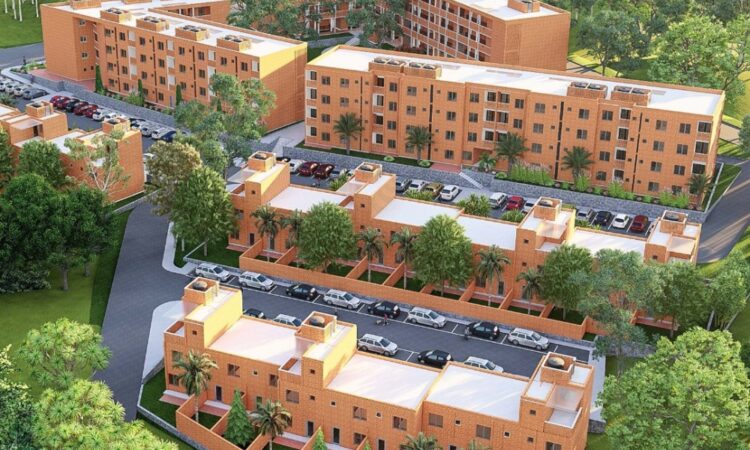Fortis Green Launched Its First Eco-Housing Estate in Rwanda: Fortis Green housing, a Kigali-based American developer, launched an eco-estate in Kigali’s Masaka sector following a year and a half of extensive market research that identified strong demand for quality rental housing and affordable green homes in Rwanda.

Masaka views marks its first real estate development in the country. Spanning seven hectares, the estate will feature 51 single-family homes, 33 townhouses, and 302 one-to-three-bedroom apartments.
Construction officially began on Friday, October 24, with diverse units already purchased. The first stage, which includes single-family homes and townhouses, is scheduled for completion by early 2026. The first apartment block will be ready within 11 months. All in all, the project is expected to be fully completed in about two and a half years.
Everybody builds to sell, and about 95% of those homes end up being rented out. Jonathan Shafer, the CEO of Fortis Green, said that the demand for rental housing is still quite high while the number of actual homebuyers remains low due to financing costs and limited mortgage access. So, as we think of building the community, it makes sense to own this long-term and set pricing as low as possible to make it reachable to more people. To ensure accessibility across a broad range of buyers and tenants, Fortis Green has arranged its pricing to suit a variety of budgets.

The Impact of Eco-Housing Estate on Rwanda’s Tourism Industry.
The development of eco-housing estates in Rwanda is having a deeply positive impact on the country’s tourism industry.
Sustainable tourism practices: Eco-housing estates can promote sustainable tourism practices like energy efficiency, waste reduction, and conservation, which can help protect Rwanda’s natural resources.
Attracts eco-conscious tourists: Sustainable housing and infrastructure appeal to a growing market of environmentally aware travellers who are willing to pay for responsible and high-end experiences.
Enhances Rwanda’s destination image: Green building and housing practices strengthen Rwanda’s reputation as a conservation-focused nation, especially for high-end tourism, helping it differentiate from other destinations, which can bring more investment and visitors.
Promotes responsible tourism: Eco-lodges and housing can educate guests and staff on the importance of conservation, encouraging them to enjoy the area without any negative impact.
Supports Conservation: By providing a sustainable alternative to traditional development and showing the economic viability of ecotourism, these estates can help to prevent the degradation of natural habitats and promote biodiversity.
Contributes to local economies: Projects can provide local employment and training opportunities in sustainable construction and hospitality, while the tourism revenue creates support for the local communities and infrastructure projects.
Job creation and economic growth: The development and operation of eco-housing estates can create jobs and stimulate local economic growth by employing people at fair wages for construction, maintenance, and guiding.
Diversified tourism offerings: Eco-housing estates can provide special and diverse accommodation options, increase Rwanda’s tourism product, and attract a wider range of visitors.
Cultural Exchange: Eco housing estates can facilitate cultural exchange between tourists and local communities, promoting cross-cultural understanding.
Increased tourist spending: By offering unique and high-quality eco-tourism experiences, eco-housing estates can increase tourists’ spending and contribute to Rwanda’s economy.
Government Revenue Generation: Eco-housing estate can generate government revenue through taxes, fees, and permits, supporting national development projects.
Targeting markets: They appeal to a growing market of tourists who are looking for eco-friendly and responsible travel experiences.
Contributes to infrastructure development: Eco-housing developments can contribute to the development of sustainable infrastructure in secondary cities, for example, Rubavu and Musanze, which are experiencing population growth.
Habitat Protection: They contribute to Rwanda’s commitment to sustainable development by encouraging a low-emission and climate-resilient walkway and supporting the maintenance of a healthy natural environment.
Unique Accommodation Options: Eco-housing estates offer luxurious and innovative accommodation alternatives, enhancing the tourist experience and attracting high-end travellers.
Community Development: They provide economic opportunities, support local entrepreneurship, and promote cultural exchange, contributing to community development and poverty alleviation.
Sustainable Development: Eco-housing estates can work as a model for sustainable development, promoting environmentally friendly practices and community engagement.
Conclusion:
Eco-housing estates are the future of Rwanda’s tourism industry, offering eco-friendly accommodations, cultural exchange, and economic opportunities while preserving natural beauty.


